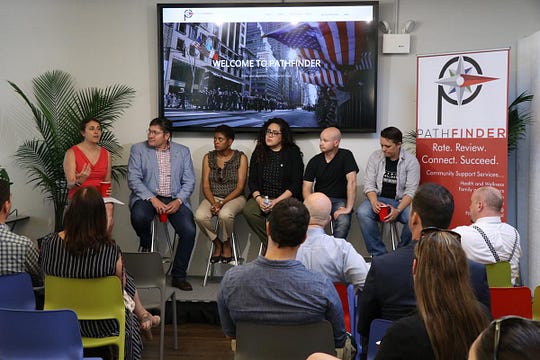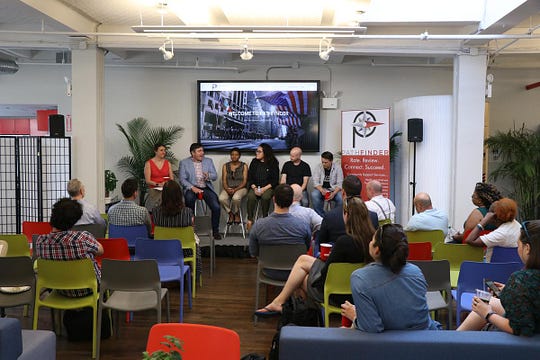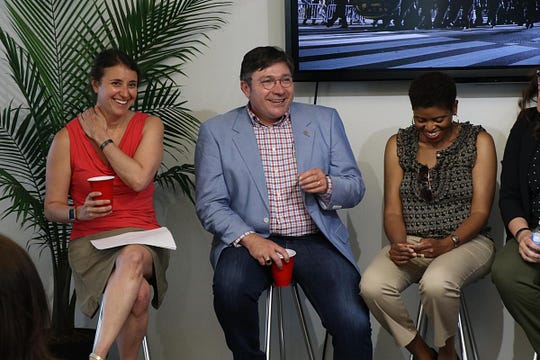By Pathfinder.vet Staff
Not everyone can make it to NYC for a panel discussion on the real scoop behind accessing support services during the reintegration from military to civilian life, and we get that. But the information shared during conversations on Pathfinder Labs’ inaugural Community Transitions panel was bigger than the 40 person audience, so here’s an after action report.
Who was there: The Audience. As a change from many panels the bulk of the audience were not military members or Veterans. But nearly all found they have some connection to the service through family, friends, neighbors, organizations, and more. Some were surprised to think of themselves as a part (an important part!) of the reintegration process and to be warmly included in the Greater Veteran Community.
The main event: The Panelists. The key to great conversation was in the great, diverse panel: Two officers, two enlisted. Three services. Career reserves and career active duty. Spouses. Post-military careers from education to non-profit to entertainment. Each had insights not often discussed in any setting.
Brett Morash: Currently the CFO of the Bob Woodruff Foundation, Brett retired from the military as a Navy Commander. He knew he wanted to work in NYC and commute in on the train, coffee and a lox bagel in hand, and that was about it. He applied to every job from janitor to executive at first, finding that despite a long and successful career he had little knowledge of not what he could do, but what he wanted to do. He acknowledged that officers have an advantage over enlisted when getting in the door for an interview, but that might be where it ends if you can’t find a network and a way to structure decisions post-military.
Marie Roker-Jones: Raising two boys in NYC while her husband deployed on 5 tours with the Army National Guard is not easy, but Marie has been doing so for nearly 20 years. Especially being in a city without a military network to provide support, Marie (now a co-founder of military internship connection company OweYaa) struggled to find resources on her own. She lamented the challenges spouses and families face, confronting the fact that the hardest part of all might be in the weeks after the Servicemember returns from a tour of duty and roles in the home have to adjust over and over.
Pamela Campos-Palma: From Active duty to Reserve Air Force duty, Pam knew she had to get an education in order to advance her career. But what school she should attend, which ones support Veterans and how did they do so, and what did she need to do during her transition from Active to Reserve service to make it all work were questions she couldn’t seem to get answered. Housing, expenses, and even what major to choose affected her daily life as she was still trying to understand all the other factors that came from leaving active service, and Air Force transition assistance provided little insight beyond national, for-profit schools.
Benari Poulten: A career Army Reserves Master Sergeant with multiple deployments, Benari embraced his network upon every return to home life to help reintegrate. With an English degree and a Master of Fine Arts, he harnessed offerings in the Veteran community and Veteran-related internships to find positions in comedy and television writing. Nothing came easy; he needed to push himself, reach out, and ask for assistance every time and knows many Veterans struggle with requesting help.
Kristen Rouse: From Guard to Active Army to Reserves and deployments throughout, Captain Kristen Rouse stressed the need to connect and communicate both within and outside the Veteran community. She acknowledged the fact that every return and reintegration is fundamentally different and some are more difficult than others, even within the same individual. Now the founder of the New York City Veterans Alliance, Kristen is doing her best to help increase communications between Veterans and everything the local community has to offer.
Themes: So what were the main takeaways?
- It’s confusing out there. Sometimes it seems like nothing is available, sometimes it’s just being unable to sort through the different things that are there. Brett noted there are over 40,000 non-profits — not including government, school, and corporate opportunities — that can be impossible to sift through. It’s even hard for the foundations to find the best places to contribute, so imagine how that is for a family going through reintegration in a new city! Marie agreed: you need to know where to look for help.
- Families, friends, and neighbors want to help when asked. Benari forced himself to stay in touch with everyone he knew during every deployment, but it was still hard to actively ask for help when it came time to looking for work when he returned. Pam supported his statement, noting that as military members you often need to accept situations and adapt without looking “weak” by seeking assistance. This carries over into the civilian world, so we as a community need to do better not only pushing out what is offered to those who might need it, but as Veterans learning to pull that information from our network.
- Even if it’s only one thing, join. Kristen said the one thing she wished she had during her most recent — and hardest — reintegration was information about organizations. She ultimately joined one volunteer organization she happened to come across, put her military skills to use in a civilian setting, and found her stress subsided. That organization led to another, recommended through her peers, and she could grow. Each panelist could identify the starting point that led to their successful reintegration, be it school groups, organizations, or work.
- Veterans need to network with everyone. Every panelist found success through creating and using a network of both Veterans and civilians. Support each other. Share what you know so others can learn. Write (anonymous) reviews of organizations and community opportunities, whether you are military, family, friends, or any local user of a community resource.
The panel was a hit, with suggested changes mostly focused on more time to drink the delicious beer from KCBC and to finish writing reviews of organizations. We are already looking forward to the next panel, and more importantly we look forward to hearing from you with your reviews in the interim.


